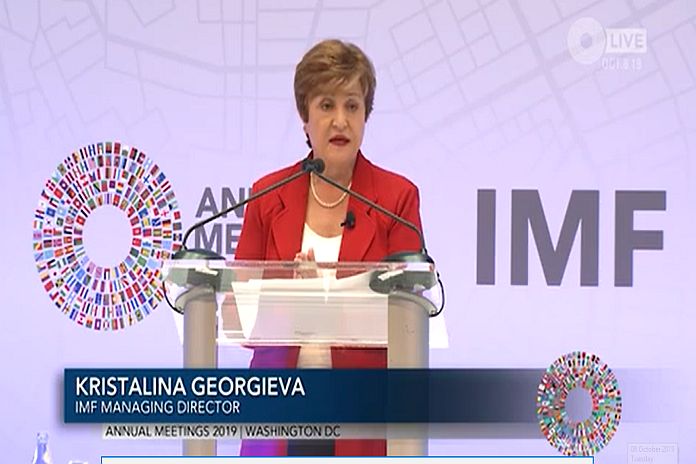MARRAKECH, Morocco – International Monetary Fund (IMF) managing director Kristalina Georgieva, Kristalina Georgieva, issued the following “Call for Action” Sunday, following her meeting with ministers of finance and central bank governors of the Middle East and North Africa (MENA) and Pakistan during the World Bank-IMF annual meetings held in Marrakech:
“The IMF-World Bank annual meetings have returned to the Arab World after 20 years when we were gathered in Dubai. Much has changed over the last two decades, but perhaps one of the most promising changes is that inclusive growth has become a household word and a unifying call across the region. Reflecting its importance, last year the IMF published a book highlighting the priority reforms that would allow MENA to achieve an inclusive and job-rich growth.
“For these annual meetings, we have built on this work and collaborated with policymakers, think tanks, the youth, and partner institutions to bring the focus for the region back to the priorities of more and better jobs, shared prosperity, and enhanced voice for youth and underrepresented groups. Many countries in the region are still struggling to ensure greater and fairer opportunities for all. A large share of youth is inactive, wide rural/urban disparities continue, and economic opportunities for women remain scarce. Social protection systems are weak and job creation feeble. Recent shocks like the pandemic and Russia’s war in Ukraine, as well as global trends like climate change and automation have compounded these vulnerabilities. The result is rising inequalities and opportunity gaps and a narrower policy space to tackle them.
“We at the IMF are a long-standing partner to countries in the MENA region in the quest for more inclusive and resilient growth. In the Amman (2014) and Marrakech (2018) regional conferences, we called on MENA policymakers, the private sector, and civil society to build a new social contract to ensure that the benefits of economic development accrue more broadly to all citizens. While progress has been slow, preserving reform momentum is essential. These Annual Meetings in Marrakech provided an opportunity for us to put forward a renewed call for action to persevere to close the gap between the growth models of the past and the growth engines of the future.
Action is required on five fronts:
- Foster a vibrant private sector. Developing the region’s private sector will require eliminating the many barriers preventing new firms from entering markets and existing small businesses and startups from growing in scale. In this context, levelling the playing field between public and private firms is a key priority for the region. Reforming burdensome government regulations, enhancing financial inclusion, and, more broadly, promoting good governance can significantly improve economic growth in MENA. Accelerating digitalization and investing in new technologies will help achieve many of these goals.
- Overhaul social protection systems. Guaranteeing citizens more equal access to basic services – such as health, education, and social insurance – through more efficient, cost-effective, and targeted social assistance will ensure that those most in need could experience a visible improvement in their livelihoods.
- Provide opportunities for the youth. This will require revamping education and training systems to address skills mismatches and ensure that the 100 million youth reaching working age in the next 10 years will have the skills sought by 21st-century employers. Better access to finance will foster entrepreneurship and support innovation and creation.
- Ease barriers to female participation in economic life. Many MENA economies have in common a relatively large pool of highly educated young women who do not find their way into effective participation in formal labor markets. The region cannot afford to continue underutilizing this human capital. Doubling the female labor force participation rate over the next 15 years can improve potential output in a country like Morocco by about 3 percent.
- Make green investment an engine of growth and job creation. Adaptation strategies would not only boost growth but also improve inclusiveness, as it is the most vulnerable who benefit the most from reduced exposure to catastrophic events. The transition to renewable energy sources is not only necessary for sustainability reasons but could also be a powerful engine of growth and job creation.
“Macroeconomic stability will be an essential foundation for transformative change. High levels of public debt in a number of MENA economies leave them vulnerable to future shocks. Rebuilding fiscal buffers may require redesigning tax systems to widen tax bases, improve the progressivity of taxation, and reduce distortions that lead to informality.
“These principles will form the basis of the IMF’s engagement with MENA policymakers and other stakeholders for the years to come. Structural reforms take time. By working together, we can tackle old and new challenges and build a future for the region grounded in a more sustainable and inclusive model of development.”
IMF Communications Department





